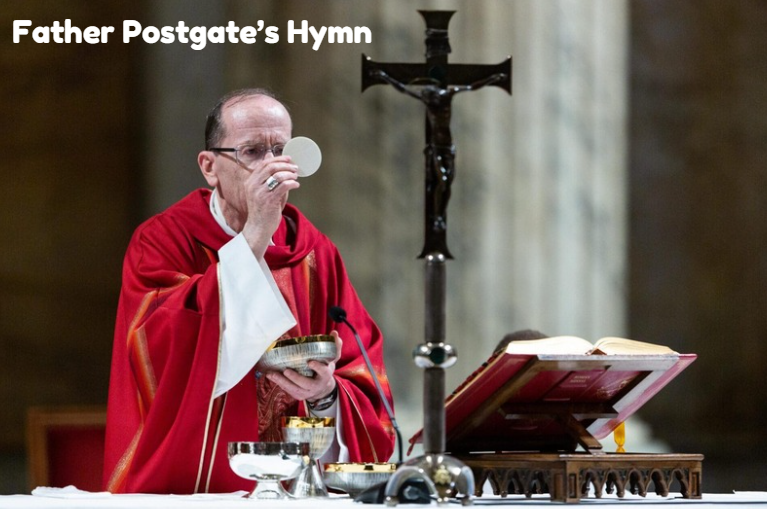Contents
- 1 Introduction to Father Postgate and His Legacy
- 2 Historical Context: England’s Persecution of Catholics
- 3 The Life of Father Nicholas Postgate
- 4 Father Postgate’s Hymn: A Song of Faith and Martyrdom
- 5 Why Father Postgate’s Hymn Continues to Resonate Today
- 6 Father Postgate’s Hymn and the American Catholic Experience
- 7 FAQs About Father Postgate’s Hymn
- 8 Conclusion: The Enduring Legacy of Father Postgate and His Hymn
Introduction to Father Postgate and His Legacy
Father Nicholas Postgate, a figure celebrated for his enduring faith and courage, is immortalized in what is known as Father Postgate’s Hymn. His name resonates deeply among Catholics and those who admire religious perseverance, particularly during a period of severe persecution in England. Born in the early 17th century, Father Postgate became a Catholic priest during one of the most tumultuous periods of English history, when being Catholic was equated with treason. His hymn serves as an ode to his unyielding commitment to his faith, even in the face of extreme adversity.
In this article, we will explore the life of Father Nicholas Postgate, delve into the significance of his hymn, and examine the historical context that surrounded his ministry. We will also analyze why Father Postgate’s Hymn continues to inspire the faithful today, especially in the United States, where religious freedom is treasured but often taken for granted. Furthermore, we’ll explore how Father Postgate’s story provides a window into the broader narrative of religious persecution and resilience.
Historical Context: England’s Persecution of Catholics
Before we dive into the hymn itself, it’s crucial to understand the environment in which Father Postgate lived. England in the 17th century was a land of religious division. After the English Reformation, Catholics found themselves marginalized and often persecuted under laws that criminalized the practice of their faith. From the Elizabethan era onward, Catholic priests were seen as enemies of the state. Practicing Catholicism could lead to imprisonment, exile, or execution.
This period, often referred to as the Penal Times, was marked by strict laws that made it illegal for Catholics to openly practice their religion. Catholic priests, including Father Postgate, were forced to minister in secret, traveling between homes to celebrate Mass, administer sacraments, and offer pastoral care. This dangerous existence demanded an unwavering commitment to faith and a willingness to accept martyrdom.
The Penal Laws and Their Impact
The Penal Laws were designed to suppress the influence of Catholicism in England, effectively forcing Catholics to choose between their faith and their safety. Priests were hunted, and those who harbored them risked severe punishment. In the North Yorkshire region, where Father Postgate lived and ministered, these laws were particularly harsh.
Yet, despite the danger, Father Postgate remained devoted to his calling. For over 50 years, he traveled the moors, offering spiritual guidance to isolated Catholic families. His ministry was one of endurance, faith, and quiet defiance against the oppressive forces of the state. It is this perseverance that forms the foundation of Father Postgate’s Hymn, a song of unwavering dedication in the face of overwhelming odds.
The Life of Father Nicholas Postgate
Father Nicholas Postgate was born in 1596 in Egton, a small village near Whitby, North Yorkshire. He was raised in a devout Catholic family during a time when Catholicism was under siege. Despite the dangers, Postgate felt called to the priesthood and eventually traveled to France to study at the English College at Douai, a seminary that trained Catholic priests for clandestine missions back in England.
Ordained in 1628, Father Postgate returned to England, where he spent the next five decades ministering in the North York Moors. His ministry was characterized by humility, courage, and a deep sense of responsibility to the Catholic faithful. Traveling on foot across the moors, often in disguise, he administered the sacraments and performed baptisms, weddings, and funerals in secret.
His commitment to his parishioners was absolute, even though it put him at constant risk. Father Postgate’s mission culminated in 1679, when he was arrested while baptizing a child in Redcar. At the age of 83, he was taken to York, where he was charged with being a Catholic priest—an offense punishable by death under the Penal Laws. He was found guilty and hanged, drawn, and quartered on August 7, 1679, at the Tyburn gallows in York.
Father Postgate’s Martyrdom
Father Postgate’s execution was not just the end of his life, but the beginning of his legacy as a martyr. His death symbolized the ultimate sacrifice made by many Catholic priests who defied the laws of the land to uphold their religious beliefs. Father Postgate’s courage in the face of death inspired the creation of Father Postgate’s Hymn, a song that reflects the strength of his faith and the righteousness of his cause.
The hymn is a tribute to the life of Father Postgate and an expression of the resilience of Catholics during the Penal Times. It serves as a reminder that faith can thrive even in the darkest of circumstances, and it stands as a testament to the enduring power of religious conviction.
Father Postgate’s Hymn: A Song of Faith and Martyrdom
Father Postgate’s Hymn is not merely a religious song, but a narrative encapsulating the suffering and perseverance of an entire community of persecuted believers. The hymn’s lyrics recount the trials and tribulations faced by Father Postgate, as well as his steadfast commitment to his faith. It is a hymn sung not only in remembrance of him but also as a broader tribute to the Catholic martyrs of England.
The Lyrics of Father Postgate’s Hymn
While various versions of the hymn exist, they all share a common theme of honoring Father Postgate’s sacrifice and his devotion to God. The lyrics often focus on his quiet strength, his humility, and his courage in the face of persecution. Some versions of the hymn also reference the broader context of the Catholic struggle during the Penal Times, drawing attention to the many priests and laypeople who suffered alongside Father Postgate.
The hymn is often sung during religious services that commemorate the English martyrs, particularly on the feast day of Blessed Nicholas Postgate, which is celebrated on August 7th. It serves as a poignant reminder of the sacrifices made by those who came before and the importance of religious freedom in today’s world.
Why Father Postgate’s Hymn Continues to Resonate Today
For many Catholics, particularly in the United States, Father Postgate’s Hymn serves as a powerful reminder of the struggles faced by their ancestors. It speaks to the universality of faith and the challenges that believers have faced throughout history. In a country where religious freedom is enshrined in the Constitution, the hymn offers a stark contrast to the realities of persecution faced by Father Postgate and his contemporaries.
In recent years, there has been a resurgence of interest in the lives of the Catholic martyrs of England. This has been fueled in part by the canonization of many of these martyrs and the growing recognition of their contributions to the history of the Catholic Church. Father Postgate’s Hymn plays a significant role in this revival, as it connects modern believers with the stories of those who laid down their lives for their faith.
The Hymn’s Role in Modern Catholic Worship
In Catholic communities across the United States, Father Postgate’s Hymn is often sung during services that honor the English martyrs. It is particularly popular during the month of November, which is dedicated to the remembrance of all saints and martyrs. The hymn is also used during special Masses and religious events that focus on the theme of religious freedom.
For American Catholics, the hymn serves as a link to the broader history of their faith, reminding them of the sacrifices made by those who came before them. It also resonates with those who may be facing their own struggles, offering a message of hope and perseverance.
Father Postgate’s Hymn and the American Catholic Experience
The story of Father Postgate and the hymn dedicated to him holds special relevance for Catholics in the United States. While the United States has historically been a place where religious freedom is protected, there have been periods of anti-Catholic sentiment, particularly in the 19th and early 20th centuries.
In many ways, the story of Father Postgate parallels the experiences of American Catholics who faced prejudice and discrimination but remained steadfast in their faith.
Religious Persecution in the United States
Although not as severe as the persecution faced by Father Postgate, American Catholics have historically encountered discrimination. During the 19th century, waves of Catholic immigrants from Ireland, Italy, and other predominantly Catholic countries faced hostility from the predominantly Protestant American population. Catholic churches were burned, and Catholics were often barred from holding public office or participating fully in society.
Despite these challenges, American Catholics persevered, building strong communities and institutions that continue to thrive today. The story of Father Postgate serves as a reminder of the resilience of faith in the face of adversity, a theme that resonates deeply with American Catholics who understand the struggles of their forebears.
A Symbol of Resilience
In many ways, Father Postgate’s Hymn symbolizes the resilience of the Catholic faith, not only in England but also in the United States and other parts of the world where believers have faced persecution.
It is a hymn that speaks to the universal struggle for religious freedom and the enduring power of faith. For American Catholics, it is a reminder that the freedoms they enjoy today were hard-won and must be protected for future generations.
FAQs About Father Postgate’s Hymn
1. Who was Father Nicholas Postgate?
Father Nicholas Postgate was a Catholic priest who ministered in England during the 17th century. He is best known for his dedication to his faith during a time of intense Catholic persecution in England. He was martyred in 1679 for his faith.
2. What is Father Postgate’s Hymn?
Father Postgate’s Hymn is a religious song that honors the life and sacrifice of Father Nicholas Postgate. It celebrates his courage, faith, and resilience in the face of persecution.
3. Why is Father Postgate considered a martyr?
Father Postgate is considered a martyr because he was executed for practicing his Catholic faith in defiance of the English Penal Laws, which made it illegal to be a Catholic priest. His death is seen as an act of faith and sacrifice.
4. How is Father Postgate remembered today?
Father Postgate is remembered through various forms of commemoration, including Father Postgate’s Hymn, religious services, and feast days that honor his legacy as a Catholic martyr. He is especially revered in England and among Catholics worldwide.
5. What is the significance of Father Postgate’s Hymn in modern Catholic worship?
Father Postgate’s Hymn serves as a reminder of the sacrifices made by Catholics during the Penal Times and is often sung during services that honor martyrs and saints. It is a symbol of faith, resilience, and the enduring power of religious conviction.
Conclusion: The Enduring Legacy of Father Postgate and His Hymn
Father Nicholas Postgate’s life and the hymn that bears his name offer a powerful lesson in the strength of faith in the face of adversity. His story is one of resilience, courage, and unwavering commitment to religious beliefs, even when confronted with the threat of death. For Catholics in the United States and around the world, Father Postgate’s Hymn serves as a poignant reminder of the sacrifices made by those who came before and the importance of protecting religious freedom today.
As the hymn continues to be sung in churches and religious services, it keeps alive the memory of Father Postgate and the many others who laid down their lives for their faith. It stands as a testament to the enduring power of faith and the resilience of the human spirit in the face of persecution.




